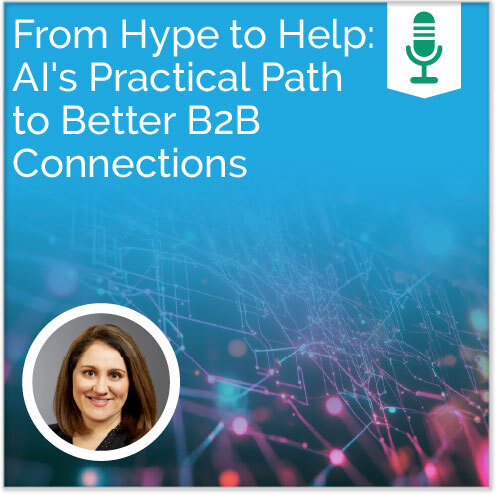From Hype to Help: AI’s Practical Path to Better B2B Connections
Episode Notes and Resources
On this episode of the Ad Victoriam Salesforce Simplified podcast, we’re delighted to have Megan Burns, a Customer and Employee Experience expert, as a guest, who helps good people deliver great experiences. She stopped by the podcast to talk about AI and how it is being incorporated into B2B customer experiences.
Chapters:
[00:34] – Meet Megan Burns
[04:20] – AI transforming the way B2B companies handle customer success
[06:21] – B2B company misconceptions about implementing AI
[09:00] – AI can help companies predict and prevent customer churn
[11:03] – AI can help deliver personalized experiences in B2B relationships
[13:49] – How B2B companies can leverage AI tools
[15:01] – Unexpected ways AI improves B2B customer experience
[16:44] – The balance between automation and human interaction
[19:22] – Metrics in AI
[22:14] – The future of AI and B2B customer experience
Transcription:
Announcer: This is Salesforce Simplified, the podcast from Ad Victoriam Solutions. Here’s your host, Mike Boyle.
Mike Boyle: Hello, everyone, and thank you for joining me today on the podcast. We are delighted to have Megan Burns as a guest. And Megan is a customer and employee experience expert. She’s here today to talk specifically about AI and how it’s being incorporated into B2B customer experiences.
So, before we introduce Megan officially, just a little bit more about Megan. As I said, she’s a customer experience expert, strategist, author, and a keynote speaker who helps Fortune 500 companies build world-class customer experience programs. A world-renowned expert in her field, Megan has led groundbreaking customer experience research as a vice president at Forrester for more than a decade and has helped countless Fortune 500 firms use customer experience to build loyalty, accelerate growth, and find strategic advantage in this ever-changing world. And those who pay attention, those who’ve been long-time listeners to the Salesforce Simplified podcast, may recall that Megan was a guest, back in September of 2021, and we talked about B2B and customer experience. And if that is something that’s top of mind with you, I highly recommend that you go back and find that podcast on our website, AdVic.com, or anywhere that you get a podcast. Megan Burns, welcome back to the podcast. It’s great to have you with us today.
Megan Burns: It’s great to be back. Thank you.
Mike Boyle: Let’s just dive right in here. There’s a lot to talk about, the relationship between AI and B2B. You know, many B2B companies struggle with inconsistent customer experiences across different touchpoints. Let’s talk about how AI can help create a more unified experience, especially when dealing with multiple stakeholders within the same client organization.
Megan Burns: The answer to that question is emerging. And the interesting thing is that most of my work these days is focused on really change and influence. And so the piece of AI that I look at is how are organizations responding to it, and how are employees, frankly willing to use it? How much do they trust it? And so I think it has the potential to do several things. One, it has the potential to summarize. You know, it’s very hard for people to get a sense of what’s going on across a large customer organization. Different people are having different conversations, and you know, it’s hard to keep up to date with that. Depending on the company, some are. And really it’s up to whether or not their clients are comfortable with this, their customers are comfortable with this. Using some of the same AI recording and meeting tools that I, you know, you and I use as a way to capture and summarize customer conversations much more simply than was ever possible. I mean, let’s face it, how many of us actually go back and transcribe the notes from a conversation? We always say we will, but you know, we don’t.
Mike Boyle: Wink, wink…
Megan Burns: Wink, wink… You know, I’ve seen some interesting things being done with translation. That was an application that I had not really thought about, particularly in companies that have highly technical or highly specialized content. You know, if they work with companies or employees that span countries using AI to help take this complex information and make it more available to people by translating it into other languages or making it something you can listen to or watch in other formats. I’ll be honest, most of the clients that I work with are really, really cautious in their use of AI. So I think we’re really just in the early stages of this, but people are finding ways and places to use it.
Mike Boyle: So Megan, as you know, we’re seeing AI being integrated into CRM systems like Salesforce. How do you see these AI capabilities transforming the way B2B companies handle the complex multi-stage sales cycles and post-sale customer success?
Megan Burns: I mean, I think there’s a couple of things. One of the big applications that I’m seeing is when you have a B2B company that serves a large number of employees in the customer organization, right? How do you keep track of what everybody’s doing and who’s who and what are they using and all of those kinds of things and then turn that into some sort of a sense of adoption, account health, you know, things that an account representative could then use to have a conversation with the decision maker. The companies that are using AI to help paint that picture and summarize that information can walk in with a much better sense of where the customer organization is actually having value and succeeding. I’ve seen a couple interesting things. I don’t know, frankly, how much I trust this, but I’m watching it. People attempting to use AI to predict how someone would respond to a survey if they took one. So, from the people who are giving feedback and taking surveys, one of the problems has always been, I forget who, but one company called it, the voice of the silent. How do we know what the people who are not answering our surveys are thinking? And so I’ve been seeing few people trying to use AI to say, based on what this customer has been doing and what other customers have done in the past who have completed surveys, can we anticipate whether this is someone who’s going to be upset or at risk and get to them and flag them without them necessarily, even if they’re not willing to, I should say, give explicit feedback.
Mike Boyle: That’s interesting. That could be very helpful, you know. Yes, I think about it… Megan, let’s talk about some misconceptions B2B companies might be having about implementing AI, in their customer experience strategy, and talk a little bit also about what they should focus on instead.
Megan Burns: Yeah, I mean, I don’t know if it’s a misconception, but people are very much in the throes of the technology is going to solve all our problems. And AI is the latest in the parade of technologies that have been glommed onto right or wrong as the thing that is going to fix things. And it’s really a mix. You know, some people are super optimists, other people are, you know, cynics and pessimists. Most people are kind of like, I think it could do both, but I’m not sure how to use it. The thing that I think they’re not paying enough attention to, and this is an area that I’ve been digging into in my own research, is the issue of trust and AI in the consumer space. And, you know, humans are humans, whether they’re buying in a consumer or a B2B environment. There was some interesting data published recently about the fact that when a company mentioned AI, AI as a feature of their product, the conversion rates actually went down because people are nervous about it, and they don’t know if they trust AI. The bigger the decisions that people are using it to make, the more people are involved in the decision, you know, everybody’s got a sense. You know, one of the things with AI is that very few people, including myself, really understand how it does what it does. And we kind of crave this understanding, especially if there are legal issues involved, like, can you be held culpable? Like what happened with the Air Canada example, with a gentleman who booked a bereavement ticket and was told he would be reimbursed because the company’s AI told him that. And then the company said, no, the AI was wrong. And the court said, well, you have to. You’re beholden to the AI because it was part of you. I think that’s a place where a lot of people are also hesitant to trust, sort of unleashing AI directly. I think they’re going to get there. But the. I mean, in the late 90s, we asked people, you know, would you ever buy something online? And some huge percentage of them said no. Obviously, you know, people change. But I think that’s the place right now that the technology can do a lot more than the humans are comfortable letting it.
Resources:
Megan Burns’ Website
Megan Burns on LinkedIn
More B2B Resource Articles and Podcasts from Ad Victoriam Solutions


